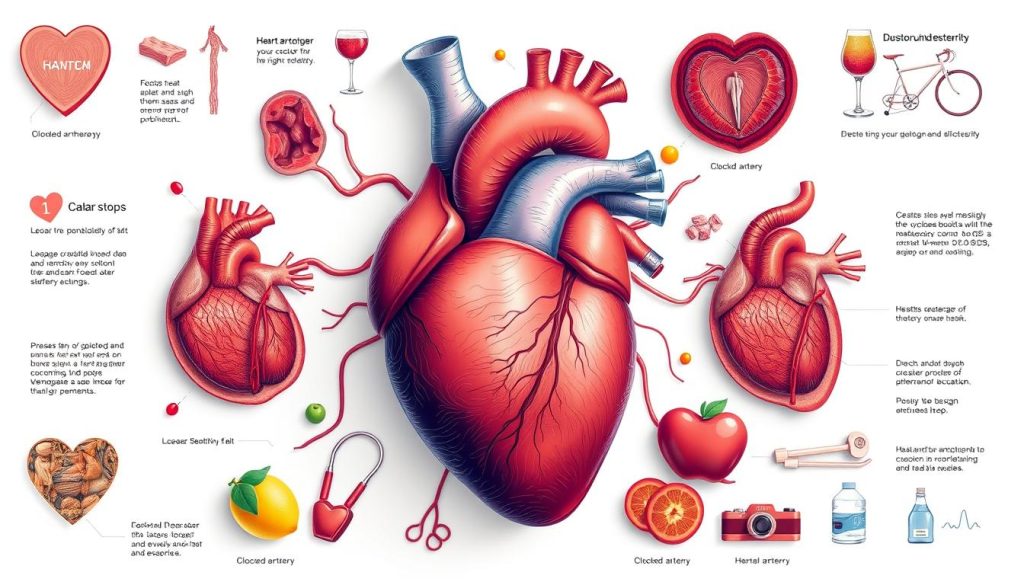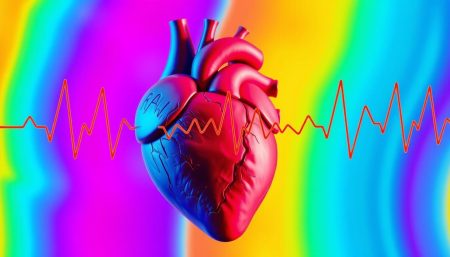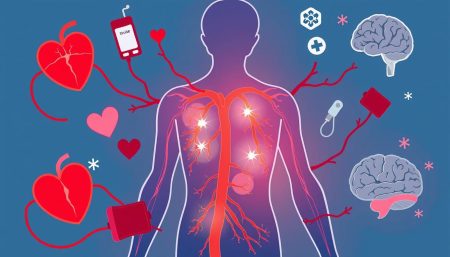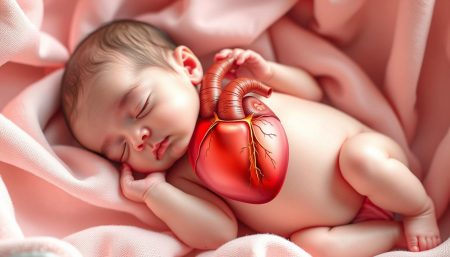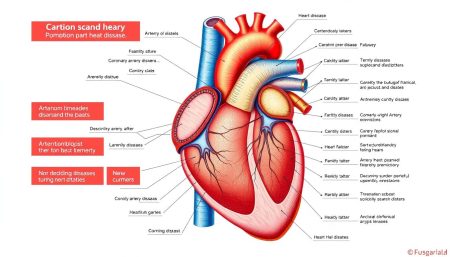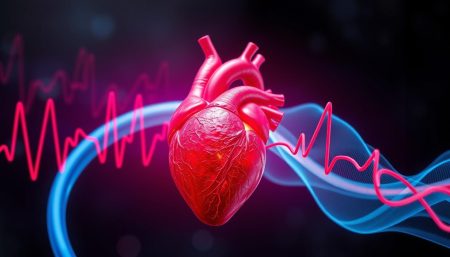Cardiovascular disease affects millions of lives worldwide. This guide explores heart health, shedding light on the causes and effects of heart disease and stroke. Understanding these conditions is key to a healthy cardiovascular system.
We’ll cover risk factors and prevention strategies. Whether you’re worried about your heart or just want to learn more, this guide has you covered. It offers valuable insights for everyone.
Let’s start a journey to understand cardiovascular disease better. We’ll find practical ways to protect your heart. Your path to better heart health begins here.
What Is Cardiovascular Disease: Understanding the Basics
Cardiovascular disease affects millions globally. It’s key to grasp its basics for heart health. We’ll look at types, system functions, and warning signs.
Types of Cardiovascular Diseases
There are many types of cardiovascular diseases. Each impacts the heart and blood vessels in unique ways. Some common ones are:
- Coronary artery disease
- Heart failure
- Arrhythmias
- Valve disorders
Knowing these conditions helps in early detection and treatment. Cardiovascular disease includes a variety of heart and blood vessel issues that need attention.
How the Cardiovascular System Works
The cardiovascular system is vital. It includes the heart, blood vessels, and blood. This network works hard to:
- Pump blood throughout the body
- Deliver oxygen and nutrients to cells
- Remove waste products
- Regulate body temperature
Common Symptoms and Warning Signs
Spotting heart disease symptoms early is critical. Watch out for these warning signs:
| Warning Sign | Description |
|---|---|
| Chest Pain | Pressure or discomfort in the chest area |
| Shortness of Breath | Difficulty breathing, specially during activity |
| Irregular Heartbeat | Palpitations or feeling of skipped beats |
| Fatigue | Unusual tiredness during everyday activities |
If you notice these symptoms, get medical help fast. Early action can greatly improve heart health outcomes.
Major Risk Factors for Cardiovascular Disease
Knowing about risk factors is important to avoid heart disease. These factors can affect your heart health. Let’s look at the main ones that lead to heart issues.
Modifiable Risk Factors
You can change some risk factors. High blood pressure and high cholesterol are big ones. Regular health checks can spot these dangers early. Smoking, being overweight, and not moving enough also raise your risk.
By working on these areas, you can lower your heart disease risk a lot.
Non-modifiable Risk Factors
Some risk factors you can’t change. Getting older increases your risk. Your family history and genes also play a part. Men usually face more risks than women, at least when they’re younger.
Even though you can’t change these, knowing them helps you take action.
Lifestyle-related Risks
Your daily habits greatly affect your heart. Eating too much fat and salt, drinking too much alcohol, and stress can harm you. But, eating right and exercising can help a lot.
Living a heart-healthy lifestyle can fight off many risks.
| Lifestyle Factor | Impact on Heart Health |
|---|---|
| Balanced Diet | Lowers cholesterol and blood pressure |
| Regular Exercise | Strengthens heart and improves circulation |
| Stress Management | Reduces strain on cardiovascular system |
Understanding these risk factors helps protect your heart. Regular health checks, a healthy lifestyle, and knowing your personal risks are key to good heart health.
Understanding Blood Pressure and Heart Health
Blood pressure is vital for heart health. Keeping an eye on it can stop serious heart problems. We’ll look at blood pressure basics, how to manage it naturally, and medication options.
Normal vs. High Blood Pressure Readings
Knowing your blood pressure is important for heart health. It’s measured in millimeters of mercury (mmHg). It’s shown as two numbers.
| Category | Systolic (mmHg) | Diastolic (mmHg) |
|---|---|---|
| Normal | Less than 120 | Less than 80 |
| Elevated | 120-129 | Less than 80 |
| Hypertension Stage 1 | 130-139 | 80-89 |
| Hypertension Stage 2 | 140 or higher | 90 or higher |
Managing Hypertension Naturally
Changing your lifestyle can help manage blood pressure. Here are some natural ways to lower it:
- Regular exercise
- Reducing sodium intake
- Maintaining a healthy weight
- Limiting alcohol consumption
- Practicing stress-reduction techniques

Medication Options for Blood Pressure Control
If lifestyle changes aren’t enough, your doctor might suggest medication. Diuretics, ACE inhibitors, and beta-blockers are common. Each type works in its own way to lower blood pressure and protect your heart. Regular check-ups and talking openly with your doctor are key for managing blood pressure and staying heart-healthy.
Cholesterol’s Role in Heart Disease
Cholesterol is key to heart health. It’s a waxy substance in our blood, important for cell membranes and hormone production. But high levels can cause serious heart problems.
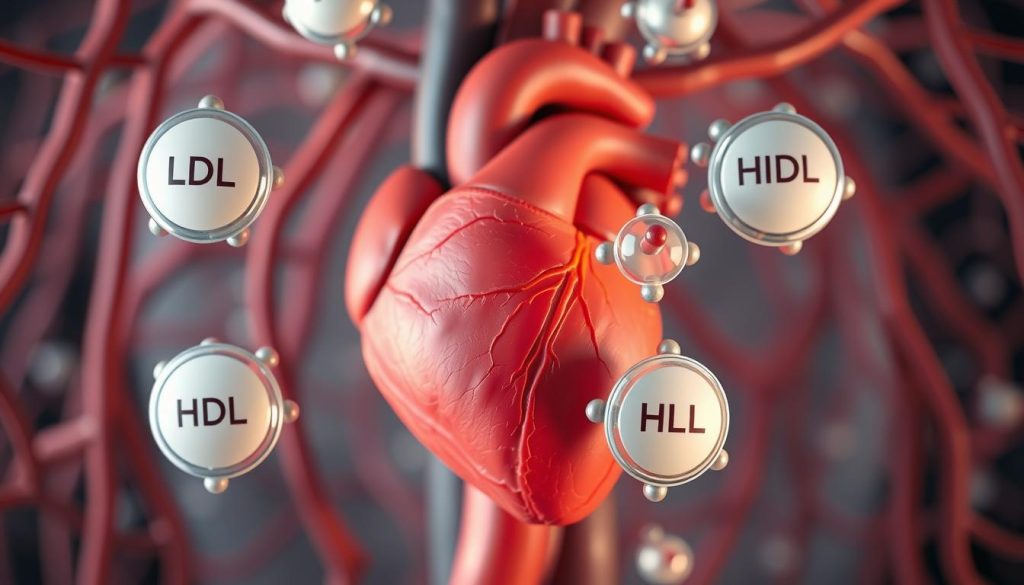
There are two main types of cholesterol: LDL (bad) and HDL (good). LDL can build up in arteries, narrowing them. HDL helps remove excess cholesterol from your blood.
High cholesterol can harm your arteries over time. This buildup restricts blood flow to your heart and other vital organs. It can cause heart attacks and strokes.
“Managing cholesterol is key to maintaining heart health and preventing cardiovascular disease.”
Lifestyle changes can help control cholesterol. Eating a diet low in saturated fats and high in fruits and whole grains can lower LDL. Regular exercise also helps manage cholesterol and heart disease risk.
In some cases, medication is needed to control cholesterol. Statins are often used to lower LDL and prevent heart attacks and strokes. It’s important to work with your doctor to find the best way to manage your cholesterol and keep your heart healthy.
| Cholesterol Type | Effect on Heart Health | Ideal Levels |
|---|---|---|
| LDL (Bad) Cholesterol | Increases risk of heart disease | Less than 100 mg/dL |
| HDL (Good) Cholesterol | Protects against heart disease | 60 mg/dL or higher |
| Total Cholesterol | Overall indicator of heart health | Less than 200 mg/dL |
The Connection Between Arterial Health and Heart Disease
Your arteries are vital for heart health. They carry oxygen-rich blood to your body. Damage or blockages can cause serious heart issues.
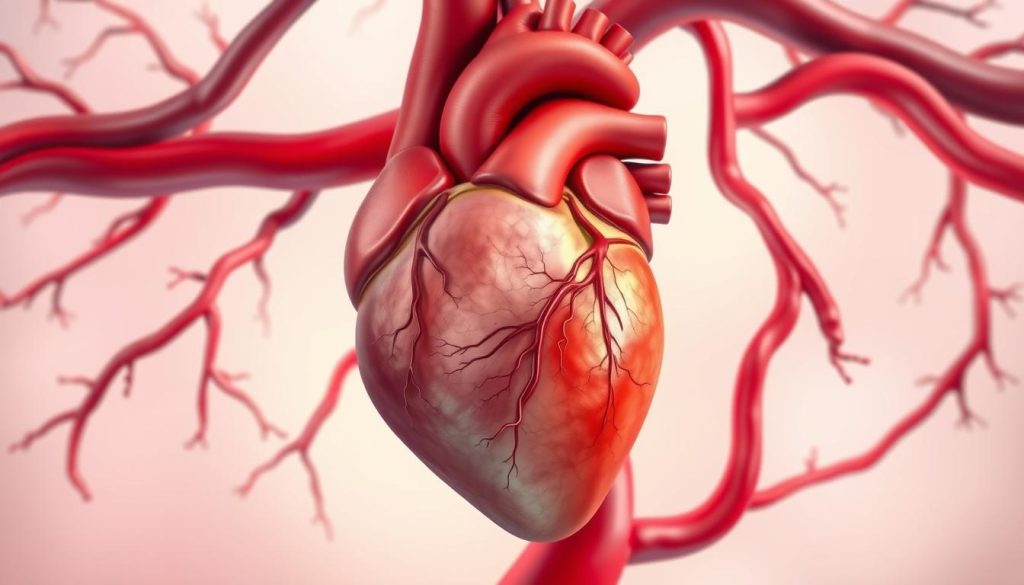
Atherosclerosis Development
Atherosclerosis is a big risk for your arteries. It happens when plaque builds up in artery walls. This narrows the arteries and cuts down blood flow. It can cause heart attacks and strokes over time.
Maintaining Healthy Arteries
Keeping your arteries healthy is essential for preventing heart disease. Here are some tips:
- Eat a diet rich in fruits, vegetables, and whole grains
- Exercise regularly to improve circulation
- Quit smoking to reduce artery damage
- Manage stress through relaxation techniques
- Control blood pressure and cholesterol levels
Warning Signs of Arterial Disease
Knowing the early signs of arterial problems can help prevent serious issues. Watch for:
| Symptom | Possible Indication |
|---|---|
| Chest pain or pressure | Reduced blood flow to heart |
| Leg pain while walking | Narrowed arteries in legs |
| Numbness or weakness | Reduced blood flow to brain |
| Sudden vision changes | Blocked arteries in eyes |
By focusing on arterial health and preventing atherosclerosis, you can lower your heart disease risk. Regular check-ups and lifestyle changes are key to keeping your arteries and heart healthy.
Essential Prevention Strategies for Heart Disease
Protecting your heart starts with smart choices. A healthy lifestyle is key to preventing heart disease. Let’s look at important strategies to keep your heart healthy.

Dietary Modifications
Eating for heart health doesn’t mean boring meals. Focus on colorful fruits, vegetables, and whole grains. Choose lean proteins and healthy fats like those in fish and nuts. Try to limit salt, added sugars, and saturated fats for your heart’s health.
Exercise Recommendations
Regular exercise is vital for heart health. Aim for at least 150 minutes of moderate exercise or 75 minutes of vigorous exercise each week. This can include brisk walking, swimming, or cycling. Any movement is better than none!
- Start with short walks and gradually increase intensity
- Find activities you enjoy to stay motivated
- Mix cardio with strength training for optimal benefits
Stress Management Techniques
Chronic stress harms your heart. Add stress-busting activities to your daily routine. Try deep breathing exercises, meditation, or yoga. Spending time in nature, pursuing hobbies, or connecting with loved ones can also help lower stress.
“Your heart is a muscle. Work it out. Nourish it. Let it rest. Keep it strong.”
By embracing these prevention strategies, you’re taking big steps toward a healthier heart. Remember, small changes can lead to big improvements in your heart health over time.
Exercise and Physical Activity Guidelines for Heart Health
Regular exercise is key for a healthy heart. It makes your heart stronger, improves blood flow, and lowers heart disease risk.

The American Heart Association suggests adults do at least 150 minutes of moderate activity or 75 minutes of vigorous activity weekly. You can split this into 30-minute sessions, five days a week.
Types of Heart-Healthy Exercises
- Brisk walking
- Swimming
- Cycling
- Dancing
- Jogging
Adding strength training two times a week can also help. It builds muscle and boosts metabolism. Start with simple exercises or light weights and get stronger over time.
“Physical activity is a miracle drug. It improves your heart health, mental health, and overall quality of life.” – Dr. Erin Michos, Associate Professor of Medicine at Johns Hopkins University School of Medicine
Exercise Intensity Guide
| Intensity Level | Heart Rate Range | Perceived Exertion |
|---|---|---|
| Light | 50-60% of max heart rate | Comfortable, can easily hold a conversation |
| Moderate | 60-70% of max heart rate | Breathing harder, can stil talk |
| Vigorous | 70-85% of max heart rate | Breathing heavily, difficulty speaking |
Start slow and increase your activity level gradually. Always talk to your doctor before starting a new exercise plan, if you have heart issues or other health problems.
Heart-Healthy Diet and Nutrition Tips
Eating right is key to a healthy heart. Smart food choices and meal planning can lower heart disease risk.
Best Foods for Heart Health
Adding nutrient-rich foods to your diet boosts heart health. Leafy greens, whole grains, and fatty fish are great. Berries, nuts, and seeds offer antioxidants and healthy fats. Lean proteins like chicken and turkey are good for muscles without too much fat.
Foods to Avoid
Some foods are bad for your heart. Cut down on processed meats, sugary drinks, and trans fats. Also, eat less salty snacks and full-fat dairy. These can raise blood pressure and cholesterol.
| Heart-Healthy Foods | Foods to Limit |
|---|---|
| Salmon | Bacon |
| Spinach | Soda |
| Almonds | French Fries |
| Oatmeal | White Bread |
Meal Planning Strategies
Good meal planning is essential for a heart-healthy diet. Begin with a weekly menu of balanced meals. Include colorful fruits and veggies, lean proteins, and whole grains. Prepare ingredients early to simplify cooking. Watch your portion sizes to avoid overeating. Planning meals helps meet your nutrition goals and supports heart health.
Living with Cardiovascular Disease: Management Strategies
Living with heart disease means taking charge of your health. By using the right strategies, you can live well and avoid serious problems. Let’s look at some important ways to manage heart disease.
Daily Monitoring Tips
It’s important to watch your health closely. Check your blood pressure often and keep a record. Also, watch your weight for any sudden changes.
Notice how you feel, like if you’re short of breath or have chest pain. These signs can tell you and your doctor if something’s wrong.
Medication Management
Using your medicines right is key to treating heart disease. Always take your drugs as your doctor says. Never skip a dose or stop taking a medicine without talking to your doctor first.
Keep a list of all your medicines, including any you buy without a prescription. This list is useful for doctor visits or emergencies. If you have side effects, talk to your doctor about them.
Lifestyle Adjustments
Changing your lifestyle can greatly help your heart. Eat a diet full of fruits, veggies, whole grains, and lean meats. Also, do regular exercise, but only if your doctor says it’s okay.
Find ways to relax, like deep breathing or meditation. If you smoke, get help to quit. These changes can make you feel better and help your heart disease treatment work better.
FAQ
Q: What is cardiovascular disease?
A: Cardiovascular disease affects the heart and blood vessels. It includes conditions like coronary artery disease and stroke. These diseases happen when plaque builds up in arteries, reducing blood flow.
Q: What are the common symptoms of heart disease?
A: Heart disease symptoms include chest pain and shortness of breath. You might also feel an irregular heartbeat or get tired easily. Swelling in the legs is another sign. Symptoms can differ based on the disease and the person’s gender.
Q: What are the major risk factors for cardiovascular disease?
A: High blood pressure and high cholesterol are big risks. Smoking, obesity, and diabetes also increase your risk. Age and family history are risks you can’t change.
Q: How can I lower my risk of developing heart disease?
A: To lower your risk, eat well and exercise often. Manage stress and don’t smoke. Drink less alcohol and keep a healthy weight. Regular health check-ups are key.
Q: What is considered normal blood pressure?
A: Normal blood pressure is below 120/80 mmHg. A reading between 120/80 and 139/89 mmHg is prehypertension. Anything 140/90 mmHg or higher is high blood pressure. Your doctor will set the best target for you.
Q: How does cholesterol affect heart health?
A: Cholesterol is important for your body but too much can harm your heart. LDL (bad) cholesterol can cause artery buildup. HDL (good) cholesterol helps remove excess cholesterol from your blood.
Q: What is atherosclerosis?
A: Atherosclerosis is when fats and cholesterol build up in artery walls. This buildup, or plaque, can narrow arteries and reduce blood flow. It’s a major cause of heart disease and can lead to heart attacks and strokes.
Q: How much exercise is recommended for heart health?
A: The American Heart Association suggests 150 minutes of moderate exercise or 75 minutes of vigorous exercise weekly. Include muscle-strengthening activities two days a week. Any exercise is good, so talk to your doctor first.
Q: What foods are best for heart health?
A: Eat fruits, vegetables, whole grains, and lean proteins like fish. Omega-3 fatty acids in foods like salmon are great for your heart. Avoid saturated fats, too much sodium, and added sugars. A Mediterranean diet is heart-friendly.
Q: How can I manage stress to protect my heart?
A: Stress management is key for heart health. Try exercise, meditation, and deep breathing. Yoga, sleep, and hobbies help too. Strong social connections and professional help are also important. Chronic stress can raise blood pressure and heart disease risk.












